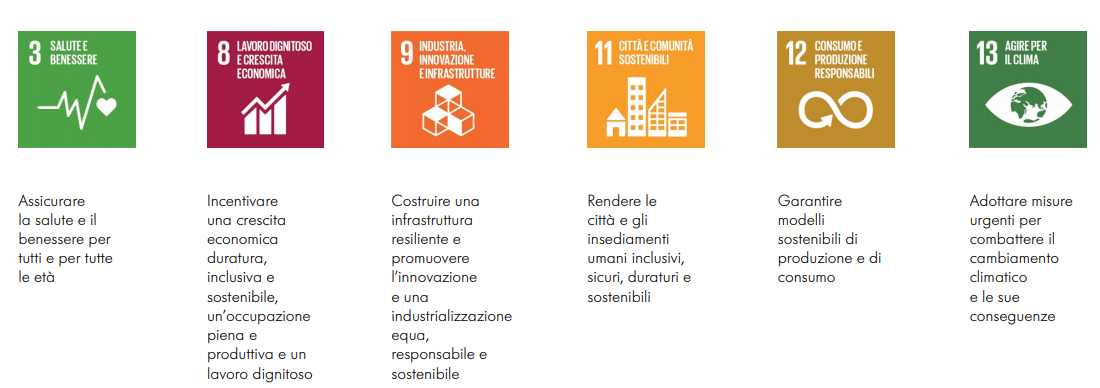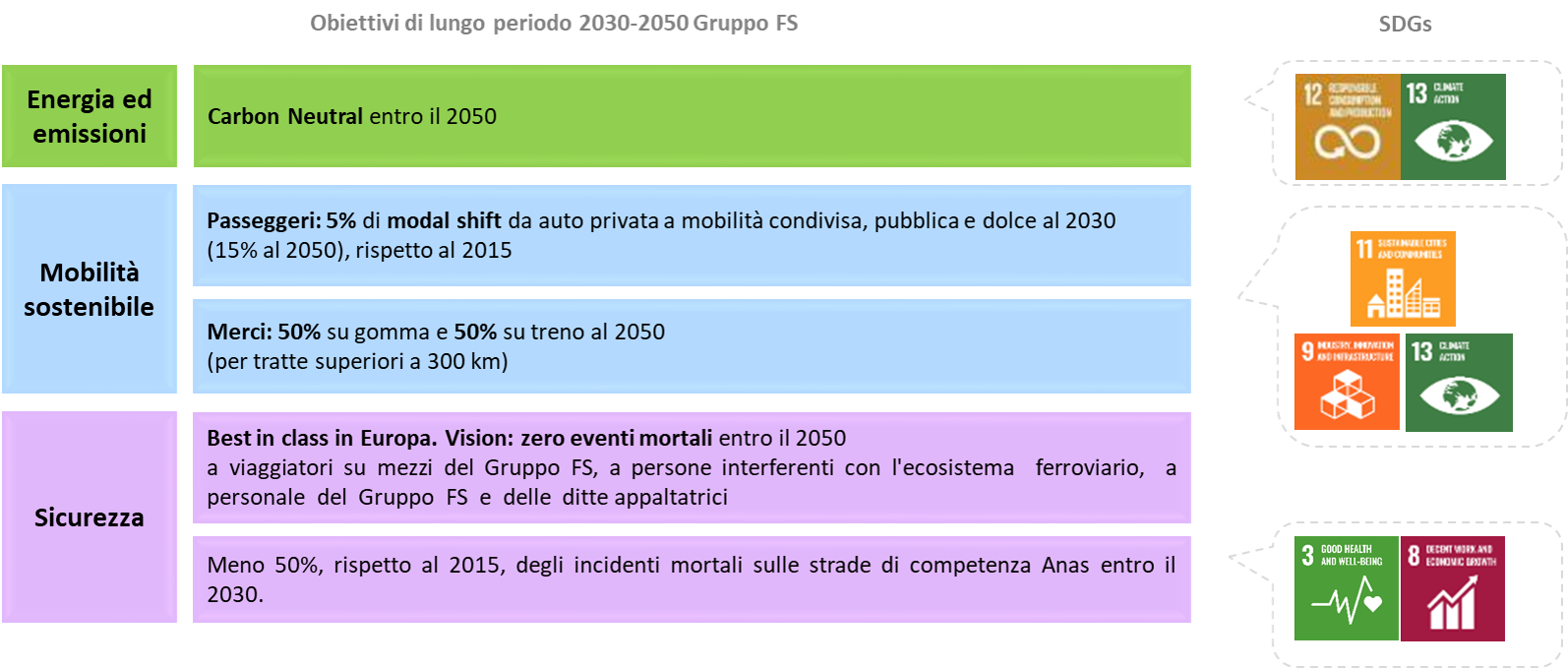Sustainability for RFI: it comes naturally to us and is something we choose to do each and every day

Sustainability is intrinsic to the nature of rail transport and is an integral part of our business, which has always driven us to continuously improve the attractiveness and accessibility of rail transport to benefit the travel needs of people and goods. |
Managing the railway network in accordance with the principles of efficiency, safety and accessibility means in itself helping to create a more sustainable travel system, an objective that is also pursued through planned initiatives to increase the integration of the network with other modes of transport and improving its attractiveness and performance for railway companies, intermodal operators and passengers. |
In the "field" and on a day-to-day basis, for us all this means developing the management, maintenance, upgrading, design and construction of lines and stations, with the utmost attention to safety, the reduction of impacts, the rational use of resources, and the management and resilience of infrastructure. It also means working from an increasingly broad and global perspective with a growing commitment to protecting, regenerating and improving the local area and its heritage, involving the entire organisation, subsidiaries, suppliers and other stakeholders and in collaboration with institutions. |
A central role in this approach is played by the constant search for innovative product and process solutions able to guarantee the continuous improvement of the efficiency, effectiveness, safety and quality of industrial activities and the "developmental” maintenance of the social value of the infrastructure and its services, in line with the increasing speed of change in the external world, particularly society and its mobility needs. |
In the new demographic (growing urbanisation, ageing population), environmental (climate risks, loss of biodiversity), technological (digitisation, artificial intelligence) and industrial (work, resources, innovations) scenarios, mobility systems, and the railway sector in particular, play a key role in people's quality of life and community well-being. |
The SDGs we can contribute most towards

With this in mind, the Ferrovie dello Stato Group has embraced the United Nations Global Compact principles, with the commitment to contribute to achieving the SDGs (Sustainable Development Goals) of the UN 2030 Agenda, in particular those that have been identified to date as the SDGs on which the Group's activities have the most significant impact.
The 2030/2050 strategic objectives approved by our Board of Directors

Together with the entire Ferrovie dello Stato Italiane Group, in recent years we played a key role in speeding up the integration of the principles and objectives of sustainable development into all corporate, strategic and industrial dimensions. |
On the input of the Group Sustainability Committee chaired by the CEO and FS and of which our CEO is a member, in 2018 we actively contributed to defining the Group's three 2030/2050 strategic objectives, identified through a structured stakeholder engagement process and approved in 2019 by our Board of Directors. |
The RFI Sustainability Committee to strengthen sustainability governance and speed up progress

In order to give further impetus to this process at corporate level, we have strengthened sustainability governance by setting up, in June 2020, the RFI Sustainability Committee. |
In keeping with the FS Group's Sustainability Committee, the RFI Committee was set up to ensure that the principles and values of sustainable development and the long-term 2030/2050 objectives are better integrated into the strategic decisions of RFI and its subsidiaries, with a view to creating value for all stakeholders and involving all levels of the company. It is chaired by the CEO and General Manager of RFI and includes all the heads of Departments/Divisions reporting directly to him. Depending on the issues dealt with, the Managing Directors of the subsidiaries are also involved in the Committee's activities. It acts in an advisory capacity to the CEO and General Manager, as Chairman of the Sustainability Committee, to support assessments and decisions relating to strategic, operational and governance choices/plans to be implemented to continuously improve RFI's sustainability profile and its contribution to sustainable development. |
We base our approach on an integrated policy and consolidated management systems

Our integrated Policy, which combines Environmental Policy, Occupational Health and Safety Policy and Safety Policy for train movement and railway operations is a tangible expression of how our approach to sustainability is based on a consolidated awareness of our role and the value of the national railway network as a key asset of the country's mobility system and as a significant reference point for the social, economic and environmental improvement of the country.
Implemented through our Integrated Safety Management System, which brings together the management systems relating to the three areas, the Integrated Policy has as its basic strategic objective the continuous improvement of the efficiency of the railway service in order to facilitate the modal shift towards the safer and less environmentally damaging rail transport system.
In particular, with the Environmental Policy we undertake to promote, in relation to our social mission, an approach that can guarantee a balance between the social, environmental and economic needs of our stakeholders, focusing on continuous attention to the prevention of environmental damage and the opportunities offered by management oriented towards environmental protection, also favouring the process of transferring mobility towards more compatible and sustainable methods for the environment. In our processes, we are committed to taking action to:
- use natural resources rationally, on the basis of their correct use rather than their availability, promoting the use of renewable energy sources as far as possible,
- take action on the design and management of all company processes to reduce environmental impacts, taking into account the entire life cycle of systems,
- increase energy efficiency and reduce consumption, through technological development and the adoption of consistent organisational behaviours,
- safeguard the local area and biodiversity, by including in the network development plans not only restoration and redevelopment measures, but also opportunities to maintain existing ones,
- define and apply organisational, managerial and human resources development processes to support strategic objectives, including, among the technical, economic and managerial skills typical of the railway sector, also those related to environmental sustainability, and
- maximise the dissemination of environmental awareness within and outside the organisation by strengthening the Environmental Management System as a priority tool for decision-making on issues impacting on the environment.
Sustainability reporting
As part of an integrated process involving the major Group Companies, since 2009 we have been reporting non-financial information on economic, environmental and social performance to be included within the “Sustainability Report (RdS) of the Ferrovie dello Stato Italiane Group in a consolidated manner and in compliance with the "GRI Sustainability Reporting Standards”. Pursuant to Legislative Decree 254/2016, from 2017 we have used the same information to draw up the Consolidated Non-Financial Statement included in the Group's Annual Financial Report. |
The reporting activity, which also involves the subsidiaries Bluferries, Blujet, Grandi Stazioni Rail and Terminalitalia, includes collecting and processing over 200 indicators and actively involves our central and local structures. |